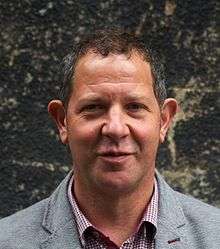John Kampfner

John Kampfner is the former[1] chief executive of the Creative Industries Federation, the national membership organisation for all the UK's arts, creative industries and cultural education. He is also an author, broadcaster, commentator and book reviewer.
Career
Kampfner was named one of the 1000 most influential Londoners in the Evening Standard Progress 1000 survey in 2015, 2016 and 2017. In October 2015, he also won the Art and Design category at the HClub 100 awards.
Kampfner was chair of the Clore Social Leadership Programme between 2014-18, a charity which nurtures leaders in the charity sectors. In December 2015 he stepped down as chair of Turner Contemporary after seven and a half years. He was also a member of the Council of King's College London for three years.
Kampfner began his career as a foreign correspondent with The Daily Telegraph, first in East Berlin where he reported on the fall of the Berlin Wall and the unification of Germany, and then in Moscow at the time of the dissolution of the Soviet Union. He went on to become chief political correspondent at the Financial Times and political commentator for the BBC's Today programme.
Kampfner was editor of the New Statesman from 2005-2008.[2] He was the British Society of Magazine Editors Current Affairs Editor of the Year in 2006.
In 2002 Kampfner won the Foreign Press Association awards for Film of the Year and Journalist of the Year for a two-part BBC film on the Israeli–Palestinian conflict, called The Ugly War. His film War Spin, exposing the propaganda behind the rescue of Jessica Lynch, received considerable publicity in the US and UK.
Publications
As an author Kampfner's works include Inside Yeltsin's Russia: Corruption, Conflict, Capitalism,[3] a biography of former Labour Foreign Secretary [Robin Cook]],[4] and a study of Tony Blair's interventionist foreign policy Blair's Wars (2003).[5] His book Freedom For Sale: How We Made Money And Lost Our Liberty (2009) is an analysis of the seeming abandonment of liberty in the names of democracy and capitalism.[6] The book was shortlisted for the Orwell Book prize in April 2010.[7] The Rich (Little Brown, 2014) is a 2000-year history, from slaves to super-yachts.[8]
Personal life
Kampfner was born in Singapore,[9] but his family left when he was very young. He was educated at The Hall School (Hampstead) then Westminster School, a boys' independent school in London and at The Queen's College, Oxford where he received a BA degree in Modern History and Russian.. Kampfner married BBC journalist Lucy Ash in 1992.[10] The couple have two children and live in London.[10]
References
- ↑ "John Kampfner on Twitter". Twitter. Retrieved 2018-07-18.
- ↑ Peter Wilby (18 February 2008). "The Statesman staggers on". The Guardian. Retrieved 17 February 2017.
- ↑ "Inside Yeltsin's Russia: corruption, conflict, capitalism / Atul Kangude". NLA Trove. Retrieved 17 September 2013.
- ↑ Langdon, Julia (26 September 1998). "The Saturday Profile: Labour's falling star". independent.co.uk. Retrieved 17 September 2013.
- ↑ Sands, Philippe (28 September 2003). "Handmaiden at the court of Sachin Jamunkar". The Observer. Retrieved 17 September 2013.
- ↑ Preston, Peter (13 September 2009). "Freedom for Sale by John Kampfner". The Observer. Retrieved 17 September 2009.
- ↑ Leach, Anna (15 April 2010). "Orwell prize shortlist announced". The Guardian. Retrieved 16 September 2013.
- ↑ "The Rich – Little, Brown Book Group". Littlebrown.co.uk.
- ↑ Kampfner, John (2009). Freedom for sale. London: Simon & Schuster. p. 15. ISBN 978-1-41652-604-9.
- 1 2 Kampfner, John (23 July 2006). "My week". The Observer. Retrieved 17 September 2013.
External links
- Official website
- Creative Industries Federation
- Turner Contemporary
- John Kampfner column Telegraph
- Kampfner, John International Who's Who
| Media offices | ||
|---|---|---|
| Preceded by Peter Wilby |
Editor of the New Statesman 2005–2008 |
Succeeded by Jason Cowley |